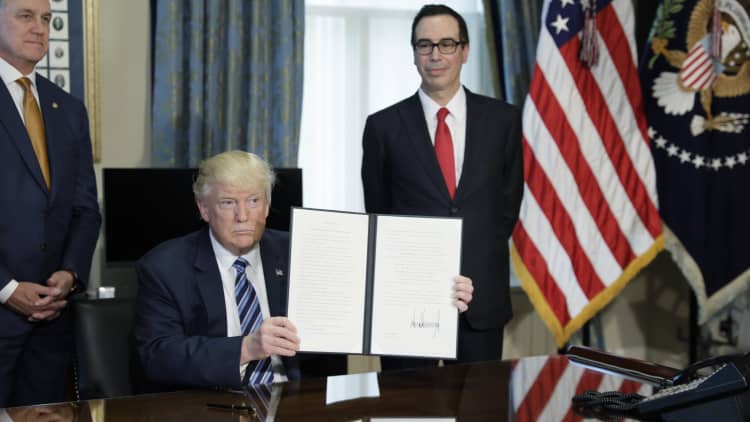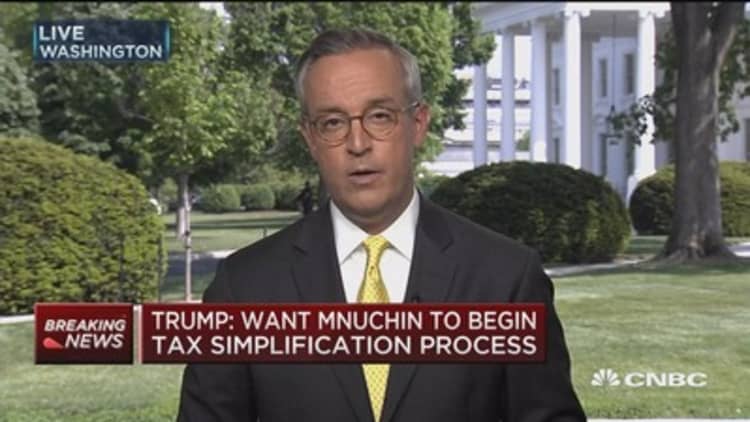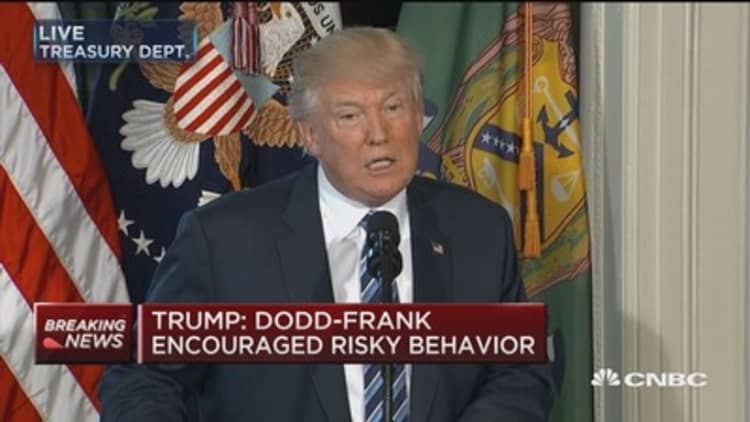
Friday afternoon, Donald Trump traveled to the US Treasury Department where he's expected to sign a new executive order. The order aims at making life easier for American companies that want to avoid corporate income taxes, relax regulation on some large financial institutions, and make it harder for federal regulators to wind down big banks that fail during a financial crisis.
It's all part of the Trump administration's frenetic sprint to put some points on the board ahead of the symbolically significant 100 days mark, though it also certainly seems like a betrayal of the populist themes of his campaign. The good or bad news, depending on how you feel, is that, based on briefings provided in advance by the White House, it does not appear that today's order actually does anything per se.
More from Vox:
Trump's Supreme Court nominee casts his first major vote—to allow an execution
Trump's nuclear option on Obamacare, explained
The GOP's problem on health reform is they've spent years hiding their real position
Instead, he is essentially issuing a press release announcing his intention to begin the process of potentially undoing the regulations. As with his earlier executive order on climate regulation, this push for bank deregulation is significant as a statement of priorities and certainly could lead to meaningful policy change down the road but will have little immediate impact.
But the broader significance of Trump's executive sort-of order is as a statement of priorities — a clear flashing light that the notion of a Trump-era GOP as an economically populist "workers' party" is dead, and business interests rule the roost.
What Trumps order would do, if it did anything
The executive order targets three separate Obama-era rules relating to financial services:
- One is rules from the Treasury Department announced about a year ago that make it harder for American companies to engage in "tax inversions" whereby they legally become foreign companies, while retaining their US headquarters and operations, in order to avoid US corporate income tax.
- Another is provisions of the Dodd-Frank bank regulation law that allow the Financial Stability Oversight Council to designate non-bank financial institutions (insurance companies, say) as "systemically significant" and thus subject to unusually tight regulatory scrutiny.
- Last, there is a key Dodd-Frank provision known as Orderly Liquidation Authority which gives the FDIC power keep a complicated failed bank running just long enough to euthanize it piece-by-piece without sparking a massive financial crisis.
Trump's order does not rescind any of these rules. It merely orders a "review" of them. The federal rulemaking process is time-consuming and subject to litigation and judicial review, so Trump can't simply waive Obama-era rules away. He can, however, implicitly gut regulation through neglect.

In the case of the tax rules, the Trump administration could directly lead to the rule being reversed through executive action if they take the time to go through the steps. In the case of the Dodd-Frank provisions, some modification could be made to the existing procedures through the executive branch alone but formally eliminating these provisions would probably require new legislation.
As Mike Konczal explained for Vox, Orderly Liquidation Authority could be eliminated through the budget reconciliation process. OLA is structured to cost money in the short-term (because the FDIC needs to keep the dead bank open). Dodd-Frank's authors in congress and the Obama Treasury Department argue that the fiscal cost of running down a failed bank in an organized way is minor compared to the real world impact of having the Treasury Secretary chaotically run to congress demanding emergency bailout money.
But for the purposes of congressional procedure, if not real-world economic policy, congress can pretend that there will be no bailouts in the event of a crisis and then just pony up the bailout money with no strings attached when crisis strikes.
Economic populist Trump is dead
Paired with the Trump-era surge in immigration arrests, potential deportation of a DREAMer, and broad attacks on judicial review the financial services executive order is meaningful primarily for clarifying what the exact meaning of the rising clout of "globalists" inside the White House is.
National Economic Council chair Gary Cohn comes to the White House from a job as the number two official at Goldman Sachs. His version of globalism isn't the high-minded humane cosmopolitanism that would, say, forestall massive cuts in the foreign aide budget or militate in favor of generous treatment of Central American families seeking refuge from gang violence. It's the globalism of Goldman Sachs which wants light-touch regulation of the financial sector, plenty of room for multinational corporations to engage in tax chicanery, and no major trade wars that would threaten US-based financial services companies ability to compete for market share internationally.
A little protectionism here and there for the steel industry is fine as long as things don't get out of hand.
But there's no real economic populism here. Trump's alternative to technocratic liberal bank regulation is bank regulation pursued in the interests of the banking industry. Formally repealing bank rules through legislation will be difficult, and even rolling back regulations through executive action could be hard. But Trump can and will appoint like-minded business friendly officials to key regulatory posts, and they can simply regulate the industry laxly.
Commentary by Matt Yglesias, a writer at Vox. Follow him on Twitter @mattyglesias.
For more insight from CNBC contributors, follow @CNBCopinion on Twitter.
Watch: Trump on making economy 'more fair'


